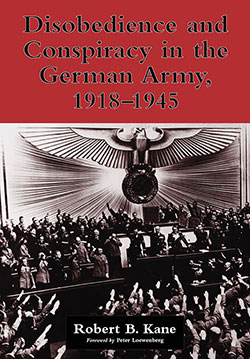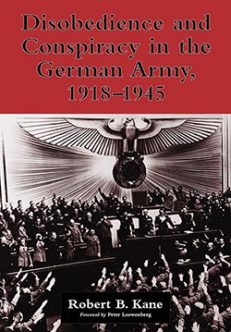Disobedience and Conspiracy in the German Army, 1918–1945
$39.95
In stock
About the Book
This work examines, among other topics, the personal oath of loyalty that the officers of the German army swore to Adolf Hitler on August 2, 1934. It discusses how the majority of officers—those who did not become conspirators against him—complied with Hitler’s orders until May 1945 despite his cruel treatment of soldiers, militarily unsound strategy and tactics, and the widespread destruction and crimes he and his forces committed.
The oath taken by the officers had a strong psychological effect among a proud corps with a long history of obedience and honor. They followed Hitler to the end even though they knew they were fighting a losing battle. The author also examines why and how only a few officers, the conspirators, began to break away, lose trust in Hitler, oppose him and finally stage an assassination attempt.
This history traces the development within the German army from 1918 of the philosophies of loyalty and disloyalty—and obedience and disobedience—as challenged by the Hitlerian oath of loyalty.
About the Author(s)
Bibliographic Details
Robert B. Kane
Foreword by Peter Loewenberg
Format: softcover (7 x 10)
Pages: 279
Bibliographic Info: tables, appendices, notes, bibliography, index
Copyright Date: 2008 [2002]
pISBN: 978-0-7864-3744-3
Imprint: McFarland
Table of Contents
Acknowledgments vii
Figures and Tables ii
German Terms and English Equivalents xiii
Abbreviations xvi
German Army Officer Ranks and American Army Officer Equivalents xvii
Foreword xix
Introduction 1
1. The Military Oath of Loyalty: Theoretical and Historical Background 13
The Military Oath of Loyalty, Obedience, and Disobedience 13
Historical Background: Prehistory to the 1660s 19
Historical Development: Prussia-Germany, 1660s–1918 26
Summary 32
2. The Army and the Weimar Republic, 1918–1930 40
Defeat and Revolution 40
The Kapp Putsch 46
Organization and Development of the Reichswehr 49
The Hitler Putsch 54
The Reichswehr After Seeckt 59
Summary 61
3. The Army and National Socialism, 1930–1934 69
The Leipzig Trial 70
The Army and Hitler, 1930–1933 76
The Army and Hitler: The First 18 Months 80
The Röhm Purge and Its Aftermath 84
Summary 89
4. The Army and the Nazi Regime, 1934–1939 97
Continuation of the Nazification Process 98
Rearmament and Its Effects 102
The Impact of Nazi Education, the Hitler Jugend, and the Reich Labor Service 106
The Development of the Oberkommando Wehrmacht (OKW) 108
The Creation of the Waffen SS 111
Summary 113
5. The Beginnings of the Military Opposition, 1936–1939 120
The First Signs of Opposition 121
The Blomberg-Fritsch Crisis 124
The Military Opposition and the Road to War 131
The Military Opposition and Hitler’s Domestic Policies 138
Summary 140
6. The Army at War, 1939–1945 147
The Senior Officers and Hitler 148
The Lower-Ranking Officers and Enlisted Personnel, and Hitler 158
The Army and War Crimes 160
Summary 167
7. The Military Opposition During the War, 1939–1945 178
The Evolution of the Military Opposition, 1939–1943 179
Stauffenberg and the Military Opposition, January 1943–June 1944 183
The July 20, 1944, Assassination Plot and Aftermath 186
Aftermath of the July 20, 1944, Coup 189
Summary 191
8. Conspirators, Nonconspirators, and Followers 197
Comparison of Conspirators, Nonconspirators, and Followers 198
Influence of Education and Family Background 199
Effects of Familial and Collegial Relationships 207
Summary 211
Summary 215
Origins 218
Consequences 219
Significance 223
Appendix A. Prussian-German Military Oaths 227
Appendix B. Political Justice in Weimar Germany 229
Appendix C. German Treatment of Soviet POWs in World War II 233
The Treatment of Soviet POWs 233
The Treatment of Western POWs 237
The Treatment of Russian POWs during World War I 239
Summary 241
Bibliography 245
Index 251
Book Reviews & Awards
“detailed analysis…Kane’s informative, interesting, and useful study is a valuable addition”—Military Review; “detailed…worth a look”—Stone & Stone Second World War Books; “provides a valuable service…his introductory discussion of obedience and disobedience is most commendable…study adds a fair discussion to the English-language literature on the topic and will appeal to readers seeking a detailed if controversial examination of the origins, significance, and impact of the Hitler oath”—Air & Space Power Journal.





